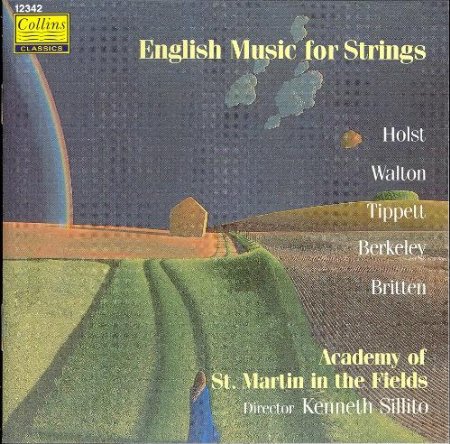English Music for Strings
View record and artist detailsRecord and Artist Details
Composer or Director: Lennox (Randall Francis) Berkeley, Michael Tippett, Benjamin Britten, Gustav Holst, William Walton
Label: Classics
Magazine Review Date: 10/1991
Media Format: CD or Download
Media Runtime: 64
Mastering:
DDD
Catalogue Number: 1234-2

Tracks:
| Composition | Artist Credit |
|---|---|
| St Paul's Suite |
Gustav Holst, Composer
Academy of St Martin in the Fields Gustav Holst, Composer Kenneth Sillito, Conductor |
| Henry V, Movement: Passacaglia: The Death of Falstaff |
William Walton, Composer
Academy of St Martin in the Fields Kenneth Sillito, Conductor William Walton, Composer |
| Henry V, Movement: Touch Her Soft Lips and Part |
William Walton, Composer
Academy of St Martin in the Fields Kenneth Sillito, Conductor William Walton, Composer |
| Simple Symphony |
Benjamin Britten, Composer
Academy of St Martin in the Fields Benjamin Britten, Composer Kenneth Sillito, Conductor |
| Fantasia concertante on a Theme of Corelli |
Michael Tippett, Composer
Academy of St Martin in the Fields Kenneth Sillito, Conductor Michael Tippett, Composer |
| Serenade |
Lennox (Randall Francis) Berkeley, Composer
Academy of St Martin in the Fields Kenneth Sillito, Conductor Lennox (Randall Francis) Berkeley, Composer |
Author:
There has almost come to be a standard 'English Music for Strings' disc, but Collins's new issue is a little bolder than most, with the Berkeley and Tippett works included rather than Elgar's Serenade, Delius's Aquarelles or Warlock's Capriol Suite. Tippett's Fantasia concertante needs very careful handling, with sharp accents and rhythms, and textures clear as daylight, if it is to make its full effect. Sillito and his top-class players succeed admirably in every respect, and their bold, virile performance is as good as any I've heard. Berkeley's sophisticated, elegant Serenade is most sympathetically played, while Britten's Simple Symphony is performed with a degree of commitment and flare which rather flatters this slightly feeble piece of juvenilia. Holst always declared that rhythm was the most important element in musical performance, and I think he would have liked the ASMF's interpretation of his St Paul's Suite, which has a very strong, uncompromising character, with fast, driving tempos—rather like his own 1925 recording (Pearl, 4/91), in fact.
Only the Walton pieces struck me as being revealed in less than their best light. Walton had a full orchestra in mind when he wrote his incidental music for Olivier's film, and the rather small-sounding ASMF doesn't have enough weight or sonority. Perhaps as if to try to compensate, Sillito takes both pieces at tempos which are a little too slow. The recording is very efficient, but rather lacking in tonal beauty.'
Only the Walton pieces struck me as being revealed in less than their best light. Walton had a full orchestra in mind when he wrote his incidental music for Olivier's film, and the rather small-sounding ASMF doesn't have enough weight or sonority. Perhaps as if to try to compensate, Sillito takes both pieces at tempos which are a little too slow. The recording is very efficient, but rather lacking in tonal beauty.'
Discover the world's largest classical music catalogue with Presto Music.

Gramophone Digital Club
- Digital Edition
- Digital Archive
- Reviews Database
- Full website access
From £8.75 / month
Subscribe
Gramophone Full Club
- Print Edition
- Digital Edition
- Digital Archive
- Reviews Database
- Full website access
From £11.00 / month
Subscribe
If you are a library, university or other organisation that would be interested in an institutional subscription to Gramophone please click here for further information.




